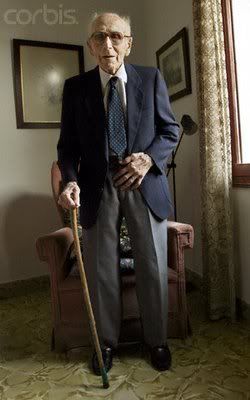While aging may not be in the genes per-se, the lack of longevity certainly is. We can CR, excercise, eat well, load up on supps and live a stress free life all we like. With today's therapies and medicine, it's unlikely anyone following such a regimen would see > 110, which, IMO isn't very old in regards to what is possible. Environmental changes can only slow the rate of intrinsic damage as the genes only provide a limited number of layers of damage repair pathways to mitigate declining functionality.
But going back to the mice studies right, you get a long lived mouse put it on 50% CR and you get another 50% of mean and max life extension... Yet the genes are 'identical' to the mouse fed a normal ad lib diet (now usually restricted a bit and not true ad lib). But doesn't this really answer our question that how much an organism eats has a massive effect on how long it lives, and equivalent of better than even some cases than genetic interventions used to make them live longer. It's not like these studies are getting mice to live equivalent to 100 years, the restricted group of mice will mostly out live all of the ad lib group, even the longest lived ones in the group. Plus have an extension of max lifespan which is something like equivalent to 150-180 years depending on the level of restriction imposed... which isn't exactly within the natural lifespan...
I accept that humans would not likely get anywhere near the level of life extension as is demonstrated in the rodents, however I don't think it would be entirely out of the question that humans on CR, starting at age 20-30 or so could get extremely close to the current max human lifespan of about 110-120 years (Calment was an extreme out lier)... with a few occasional outliers like Calment, or do a bit better. The fact that humans do sometimes live to 110 in my opinion points out that under the right conditions a lot of people could live to that age. The right condition IS Calorie Restriction I believe. But if I didn't believe this I wouldn't have been on CR for over 3 years at age 20 would I ? All males in my family live to age 85 despite bad habits, smoking, drinking etc... would I really improve upon this now that I'm CR'd.
If genes had the biggest factor, wouldn't we see a negligible effect on rodent lifespan?
We really do need biomarkers of aging, the proposed ones aren't very good at the moment, we really need to get at the molecular level as suggested and combine a number of data to confirm age. For example, when people go on CR it seems to have a rejuvenation effect on the diastolic function of the heart by making it work like a persons heart who is 15-20 years younger, yet they only been on CR say 6 years. I think there is every indication right now that most people on CR will live a long healthy life.
Edited by Matt, 11 May 2008 - 01:59 PM.




















































